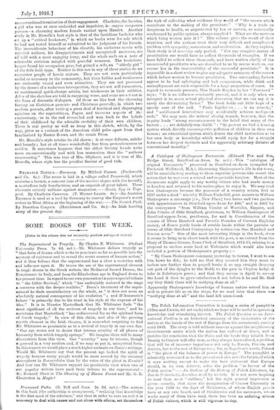The Polish Information Committee is issuing a series of pamphlets
(Allen and Unwin, (3d. net each) which we hope will be useful in spreading knowledge and stimulating interest. The Polish Question as an Inter- national Problem is an historical summary of the vicissitudes of the nation at the hands of the rest of Europe from the seventeenth cent:11-y until 1863. The story is told without rancour against the neighbouring Governments under which the nation has suffered at times, and it justifies the conclusion that the Poles and the lands they inhabit from Danzig to Cracow will offer now, as they always have offered, a problem that will be of immense importance not only to Russia, Prussia, and Austria, but to the rest of Europe too ; for, in Napoleon's words, Poland is "the pivot of the balance of power in Europe." The pamphlet is admirably restrained as to the present and also as 0 the future, of which it says nothing except to make the bare statement that Europe should, in its own interest, solve the problem "in favour of the Polish nation."—An Outline of the History of Polish Literature, by Jan do lIolowinski, describes itself by its title. It is not more inspiring to read than most "outlines," but the right general impression is given—namely, that since the inauguration of Cracow University in the year 1400 to the days of Mickiewicz, of whom English people have at any rate heard, and of Sienkiewicz and his successors, whose works many of them have read, there has been an unfailing stream of Polish culture, which is still vigorous to-day.










































 Previous page
Previous page